
A supply chain management certification demonstrates your knowledge and application of best supply chain principles. Applying learned principles in the workplace decreases operational expenses, maintains high product quality, keeps customers satisfied, and helps your organization remain competitive in its industry.
A supply chain management certification equips you with the right skills to properly manage the organization’s supply chain. Even better, you stand to benefit in your own supply chain career path. In fact, an SCM certification yields a 17 percent higher salary on average compared to uncertified SCM professionals.
A range of highly regarded SCM certifications are available to meet different interests and experience levels.
Read more: The CIO’s Role in Maintaining a Strong Supply Chain
Top SCM certifications
| Certification | Certifying Body | Focus Area | Experience Level | Price in USD | Renewal Schedule |
|---|---|---|---|---|---|
| CLTD | ASCM | logistics | intermediate | 1970+ | every 5 yrs |
| CPIM | ASCM | inventory management | entry-level | 1090+ | every 5 yrs |
| CPL | SOLE | logistics | intermediate to advanced | 225+ | N/A |
| CSCP | ASCM | general | entry-level to intermediate | 1095+ | every 5 yrs |
| SCOR-P | ASCM | supply chain optimization | intermediate to advanced | 2487+ | N/A |
| CPSD | ISM | supplier diversity | intermediate | 915+ | every 3 yrs |
| CPSM | ISM | procurement | intermediate | 2100+ | every 4 yrs |
Certification in Logistics, Transportation, and Distribution (CLTD)
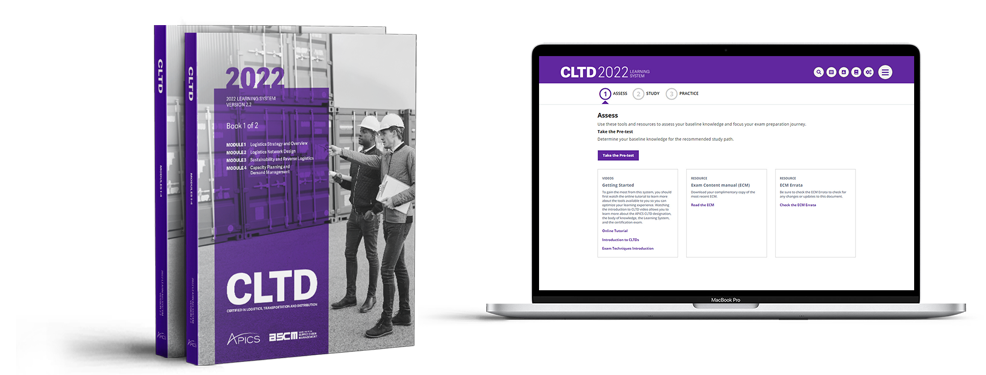
The Association for Supply Chain Management (ASCM) offers the CLTD certification which covers a broad range of supply chain logistics topics. It demonstrates to employers an in-depth understanding of best practices to streamline logistics, transportation, and distribution. Through this certification, you learn about:
- Logistics overview and strategy
- Logistics network design
- Global logistics and transportation
- Reverse logistics
- Sustainability in logistics
ASCM’s website claims that CLTD-certified professionals earn 25 percent more than their non-certified peers.
The CLTD is best for those with at least three years of experience who want to specialize in the logistics aspect of supply chain management.
Prerequisites
Before taking the CLTD exam, you must have:
- At least three years of related business experience or a bachelor’s degree
- An active, industry-recognized certification, such as the CPSM or CSCP
CLTD exam
To earn the CLTD certification, you must take one exam that assesses knowledge of capacity planning, demand management, and other logistics-related topics.
The exam consists of 150 questions with 3.5 hours to finish. You can take the exam at an authorized testing center or online in a proctored environment.
The CLTD exam costs $985 for members and $1,315 for non-members. It must be renewed every five years at which point a renewal fee is due. The renewal fee is $100 for members and $200 for non-members.
How to prepare
ASCM offers the exam and prep separately, or they can be bundled together to save money.
The “Learning System” exam prep on its own costs $985 for members and $1,370 for non-members.
If you want to bundle the “Learning System” exam prep with the exam, it costs $1,770 for members and $1,969 for non-members.
Certification in Planning and Inventory Management (CPIM)
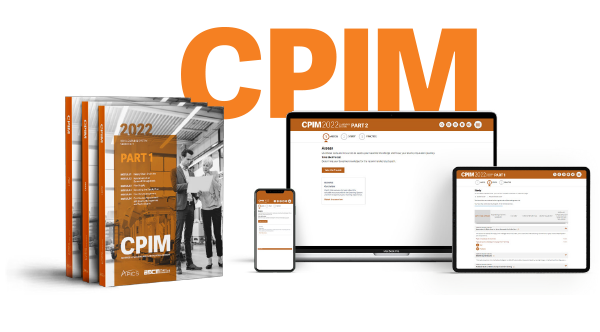
ASCM also offers the CPIM certification. The CPIM certification is globally recognized as a credential of professional competence in planning and inventory management.
With the CPIM certification, you gain knowledge in the following areas:
- Forecasting
- Capacity planning
- Master scheduling
- Materials management
- Production and production planning
- The broader supply chain network
According to ASCM’s website, those with a CPIM earn 23 percent more than their uncertified peers.
The CPIM is best for beginners who want to specialize in inventory management but also understand how it fits into the greater supply chain.
Prerequisites
There are no prerequisites to obtain the CPIM.
CPIM exams
To earn the CPIM, take two separate exams (CPIM Part 1 and CPIM Part 2) within a three-year period.
CPIM 1 focuses on the basics of supply chain management while CPIM 2 delves more deeply into management as well as how to plan and schedule resources.
Members pay $545 per exam, and non-members pay $760 per exam.
The certification must be renewed every five years and a renewal fee must be paid: $100 for members and $200 for non-members.
How to prepare
ASCM offers bundles that include both the exam fees and course materials to help save money.
The lowest bundle tier is for the self-study “Learning System” exam prep only.
- Part 1 exam prep materials cost $435 for members and $605 for non-members
- Part 2 exam prep materials cost $545 for members and $760 for non-members
If you want to bundle “Learning System” exam prep and exam fees together, ASCM offers the following:
- Part 1 exam prep materials + exam fee cost $545 for members and $760 for non-members
- Part 2 exam prep materials + exam fee cost $545 for members and $760 for non-members
Paying upfront for both exam fees and both exams’ respective prep materials costs $2059, regardless of membership status.
Udemy offers a more cost-effective prep alternative that includes mathematical, situational, and scenario-based questions as well as in-depth explanations.
Certified Professional Logistician (CPL)
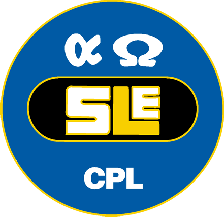
The International Society of Logistics (SOLE) offers the CPL for professionals with experience in the field of logistics.
Given the seemingly flexible nature of recertification, the CPL is a good fit if you’re a self-starters dedicated to continuous learning about logistics anyway and just want a certification to show for it. We recommend pairing this certification with others that require a more rigorous recertification process.
The CPL is best for experienced, active professionals in the area of logistics who are self-motivated to continuously learn about logistics and looking for a cost-conscious certification.
Prerequisites
You must meet at least one of the following eligibility criteria:
- Nine years of experience teaching or practicing logistics and two years of experience in two or more areas of logistics
- A bachelor’s degree and five years of relevant experience
- A master’s degree and four years of relevant experience
- A doctoral degree and three years of relevant experience
CPL exam
The multiple-choice exam for this certification is separated into four blocks of two hours for a total of eight hours.
The four exams cover the following broad topic areas, respectively:
- Systems management
- System design and development
- Acquisition and product support
- Distribution and customer support
The exam fee is $225 for members and $375 for non-members.
Upon passing the exam, you receive the CPL certification. SOLE offers CPL recertification to acknowledge CPL-certified professionals who stay abreast of trends and developments in logistics. However, it’s unclear whether recertification is required and when you need to get recertified.
The conditions of recertification require a certain number of SOLE-approved activities, such as:
- Publishing articles about logistics
- Completing college-level logistics-related courses
- Taking part in industry-sponsored training
- Attending seminars and symposiums
For recertification, one must submit an application and documentation to prove active participation in the field.
How to prepare for the exam
SOLE provides a free study guide to help with exam prep. The study guide contains a reading list for each of the four test blocks as well as practice exams.
Certified Supply Chain Professional (CSCP)
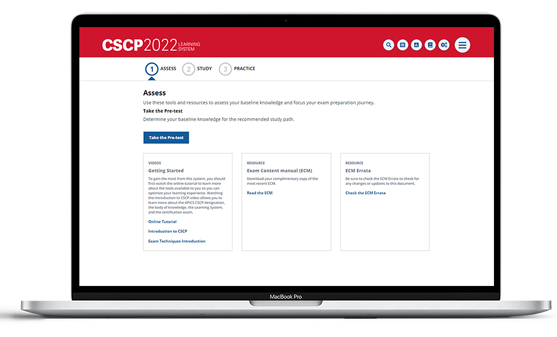
The ASCM also offers the CSCP certification, which provides a comprehensive understanding of end-to-end supply chain management. In essence, it solidifies generalist knowledge for those looking to maintain versatility within their supply chain career path.
The CSCP covers topics like global supply chain networks, forward and reverse logistics, and supply chain relationships, to name a few.
Among the other ASCM certifications discussed here, the CSCP falls between the CPIM and CPSM in terms of experience level.
Out of all three of ASCM’s offerings, we recommend the CSCP certification because it gets recipients the most return on investment. ASCM’s website claims that CSCP-certified professionals earn 40 percent more than non-certified peers.
However, regardless of which certification you decide to pursue, the ASCM’s 2021 report states that those with at least one ASCM certification have a median annual salary of $90,000, which is 27 percent higher than salaries of uncertified peers.
Best for those who are interested in learning about supply chain management from a 10,000-foot view to see how the entire supply chain works together.
Prerequisites
You must meet at least one of the following eligibility criteria for the CSCP:
- bachelor’s degree
- At least three years of supply chain or related experience
- Active industry-recognized certification, such as the CPIM or CPSM
CSCP exam
The CSCP exam covers eight modules of content and consists of 150 questions to answer in 3.5 hours.
The exam costs $1,095 for members and $1,425 for non-members.
How to prepare
As with ASCM’s other certifications, a Learning System is available and can be bundled with the exam fee for extra savings.
On its own, the Learning System costs $1,095 for members and $1,520 for non-members. The exam and Learning System package costs $1,970 for members and $2,169 for non-members.
Udemy also offers a package of five CSCP practice tests to help boost confidence heading into test day.
The CSCP certification is valid for five years before it needs to be renewed.
Supply Chain Operations Reference Professional certification
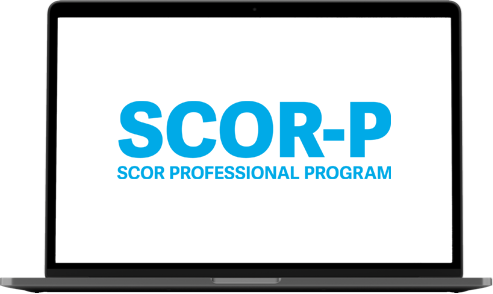
The SCOR-P certification from ASCM validates knowledge of Supply Chain Operations Reference (SCOR) model and methods. The SCOR model aligns supply chain management with business operations and strategic initiatives.
SCOR-P recipients can apply best practices and performance metrics to business processes in order to optimize the supply chain. The training course instructs on how to:
- Establish benchmarks to evaluate supply chain performance
- Close the gap between current and goal KPIs
- Apply strategic techniques to address supply chain issues
- Evaluate and manage a global supply chain using practical methods
The SCOR-P is best for those working in SCM or an SCM-supporting role who want to learn how to make their organization’s supply chain better.
Prerequisites
There are no prerequisites to obtain the SCOR-P certification.
SCOR-P exam
To obtain this certification, you must pass an exam that takes two hours to complete and contains 60 multiple-choice questions.
The exam is rolled into a mandatory training course.
How to prepare
You have to complete a training course that is broken down into seven four-hour sessions spread out over two weeks. Sessions run virtually or in-person and at the end you take the computerized exam.
The course costs $2,847 for members and $3,197 for non-members and includes the exam, so there is no need to apply for, schedule, and purchase the two separately.
The SCOR-P certification is designed for professionals working directly with or adjacent to the supply chain. The course typically draws professionals from a broad spectrum of roles from SCM to finance to customer service.
Read more at TechnologyAdvice: Key Benefits of an Optimized Supply Chain
Certified Professional in Supplier Diversity (CPSD)
The Institute for Supply Management (ISM) offers the CPSD certification. This credential provides the knowledge and skills needed to identify opportunities and tackle challenges that come up in managing supplier diversity.
Supplier diversity is the practice of engaging and managing suppliers of varying sizes and types. Having several small suppliers in combination with large suppliers keeps an organization more agile and innovative.
Read more at TechRepublic: How to make your supply chain more flexible
According to the ISM website, CSPD holders earn an average annual salary that’s 10 percent more than uncertified peers.
The CPL is best for experienced, active professionals in the area of logistics who are self-motivated to continuously learn about logistics and looking for a cost-conscious certification.
Prerequisites
In order to attain the CPSD certification, a you must have:
- Five years of relevant professional experience OR
- A bachelor’s degree and at least three years of relevant professional experience
CPSD exams
The CPSD requires passing scores on two exams:
- Supply Management Core
- Essentials in Supplier Diversity
The Supply Management Core is a foundational exam that achieves two milestones at once, as it is the required first step for the CPSD and the CPSM certifications.
The Supply Management Core exam consists of 180 questions to be answered in three hours. The Essentials in Supplier Diversity exam has 150 questions to be completed in two hours and 45 minutes.
You should expect to pay between $915 and $1,400 for members and $1,500 and $2,300 for non-members.
Upon certification completion, recipients must renew every three years. The renewal fee is $135 for members and $295 for non-members.
How to prepare
ISM offers a self-paced Learning System to help candidates prepare for one or both exams. The Learning System includes reading material and practice exams.
The CPSD Learning System prepares candidates taking both exams. It costs $742.50 for members and $1,087.50 for non-members.
For those taking only the Essentials in Supplier Diversity exam, the “Essentials in Supplier Diversity Learning System” is the better choice. It costs $495 for members and $725 for non-members.
Certified Professional in Supply Chain Management (CPSM)
The ISM also offers the CPSM certification which is designed to train candidates on supply chain management best practices and how to apply them in the workplace.
Through the CPSM candidates gain a comprehensive understanding of end-to-end supply chain management, such as sourcing, quality management, and supply chain strategy.
The CPSM is best for experienced professionals who want to focus on procurement and purchasing.
Prerequisites
In order to attain the CPSM certification, you must have:
- Five years of relevant professional experience OR
- A bachelor’s degree and at least three years of relevant professional experience
CPSM exams
The CPSM requires candidates to pass three exams:
- Supply Management Core
- Supply Management Integration
- Leadership and Transformation in Supply Management
The Supply Management Core is a foundational exam that achieves two milestones at once, as it is the required first step in the CPSM as well as the CPSD discussed above.
The Supply Management Core exam consists of 180 questions to be answered in three hours.
The Supply Management Integration exam has 165 questions to be completed in two hours and 45 minutes.
The third and final exam–Leadership and Transformation in Supply Management–consists of 165 questions to be finished in two hours and 45 minutes.
Each exam costs $295 for members and $495 for non-members. Depending on membership status, one should expect to pay $2,100-$3,500 as a member and $3,300-$4,800 as a non-member for the entire certification, including Learning Systems.
Upon certification completion, recipients must renew every four years. The renewal fee is $135 for members and $295 for non-members.
How to prepare
ISM offers self-paced Learning Systems to help you prepare for the three exams. They are available for purchase as individual products at the price of $495 each for members and $725 each for non-members.
To save money, the CPSM Learning System bundle is available for $1,113.75 for members and $1,631.25 for non-members.
The investment is considerable, but according to Indeed’s survey, 63 percent of CPSM-certified respondents said this certification increased their earning potential, and 52 percent said it helped them land a job.
How to choose the right SCM certification
The right certification for you will depend on your experience level and extent of specialization.
- For beginners, we recommend the CPIM and CSCP.
- For those with three to five years of experience, CLTD, CPSD, and CPSM are great places to start.
- More experienced professionals with more than five years of SCM experience should check out the CPL and SCOR-P certifications.
All around, the CSCP yields the most value as it covers a range of supply chain management topics and is suitable for entry-level and seasoned professionals alike. Plus, its price point is at the low to moderate end of the spectrum.
Keep in mind that these certifications can be stacked on top of each other over time to further propel you forward in your supply chain career trajectory.
Read next: 2022 IT Certification Roadmap